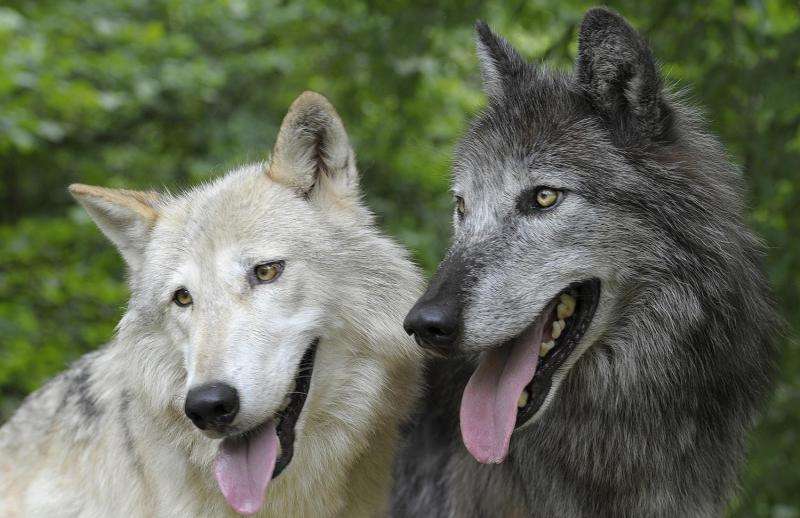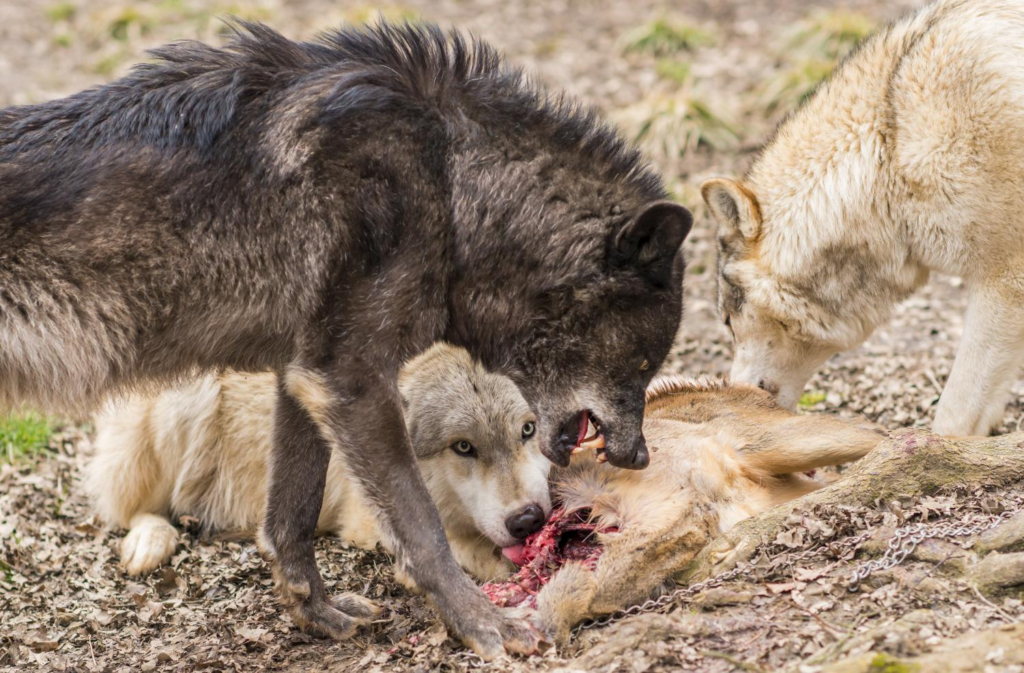Click here to sign in with or
Forget Password?
Learn more
share this!
981
75
Share
Email
April 21, 2015
by University of Veterinary Medicine—Vienna
Dogs are regarded as more tolerant and less aggressive compared to their ancestors, the wolves. Researchers from the Messerli Research Institute at the Vetmeduni Vienna question this image. They show in a recent study that wolves interact with conspecifics in an even more tolerant way than dogs, suggesting that dogs have a steeper dominance hierarchy than wolves. The results will be published in the journal Proceedings of the Royal Society B.
The good relationship between humans and dogs was certainly influenced by domestication. For long, it was assumed that humans preferred particularly tolerant animals for breeding. Thus, cooperative and less aggressive dogs could develop. Recently, however, it was suggested that these qualities were not only specific for human-dog interactions, but characterize also dog-dog interactions. Friederike Range and Zsófia Virányi from the Messerli Research Institute investigated in their study if dogs are in fact less aggressive and more tolerant towards their conspecifics than wolves.
They carried out several behavioural tests on dogs and wolves. The animals were hand-raised in the Wolf Science Center in Ernstbrunn, Lower Austria, and kept in separated packs of wolves and dogs. Range and her colleagues tested nine wolves and eight mongrel dogs.
Dogs express a steeper dominance hierarchy
To test how tolerant wolves and dogs are towards their pack members, pairs consisting of a high-ranked and a low-ranked animal were fed together. They were fed either a bowl of raw meat or a large bone.
While low-ranked wolves often defended their food against the high-ranked partner and showed aggressive behaviour as often as higher-ranked wolves, this was different in dogs. Low-ranked dogs held back and accepted the threats of the dominant dog. Overall, however, neither wolves nor dogs showed a lot of aggressive behaviour. If any, they showed threat signs.
“Wolves seem to be more tolerant towards conspecifics than dogs that seem to be more sensitive to the dominance hierarchy“, explains lead author Range. “This was shown by the fact that also low-ranked wolves can challenge their higher-ranked partners and the dominant animals tolerate it, while in dogs aggression was a privilege of the higher-ranked partners.”

“When humans domesticated wolves, they probably chose the submissive animals that were ready to adjust”, says Virányi. Dog-human interactions are more about living together without conflicts, not about equality. Their ability to respect and follow others made dogs the ideal partners of humans.
Wolves are more tolerant than dogs
Dogs and wolves are rarely aggressive towards conspecifics. Range draws the following conclusion: “Wolves are already very tolerant to their conspecifics. This was shown by the fact that high-ranked wolves accepted the threat behaviours by their lower-ranked conspecifics in the feeding experiment. This tolerance enables wolf-wolf cooperation which in turn could have provided a good basis for the evolution of human-dog cooperation.”
More information: Testing the Myth: Tolerant dogs and aggressive wolves , Proceedings of the Royal Society B, rspb.royalsocietypublishing.or … .1098/rspb.2015.0220
Journal information: Proceedings of the Royal Society B
Provided by University of Veterinary Medicine—Vienna
More information: Testing the Myth: Tolerant dogs and aggressive wolves , Proceedings of the Royal Society B, rspb.royalsocietypublishing.or … .1098/rspb.2015.0220
Journal information: Proceedings of the Royal Society B
Journal information: Proceedings of the Royal Society B
Provided by University of Veterinary Medicine—Vienna
Explore further
Facebook
Twitter
Email
Feedback to editors
20 hours ago
0
21 hours ago
0
21 hours ago
0
21 hours ago
0
Apr 3, 2024
0
4 hours ago
13 hours ago
14 hours ago
14 hours ago
15 hours ago
15 hours ago
15 hours ago
15 hours ago
15 hours ago
15 hours ago
Mar 30, 2024
Mar 27, 2024
Mar 20, 2024
Mar 18, 2024
Mar 17, 2024
Mar 15, 2024
More from Biology and Medical
Jan 20, 2015
Jan 31, 2014
Dec 3, 2013
Dec 16, 2014
Feb 5, 2015
Apr 14, 2014
15 hours ago
14 hours ago
15 hours ago
16 hours ago
15 hours ago
17 hours ago
Use this form if you have come across a typo, inaccuracy or would like to send an edit request for the content on this page. For general inquiries, please use our contact form. For general feedback, use the public comments section below (please adhere to guidelines).
Please select the most appropriate category to facilitate processing of your request
Thank you for taking time to provide your feedback to the editors.
Your feedback is important to us. However, we do not guarantee individual replies due to the high volume of messages.
Your email address is used only to let the recipient know who sent the email. Neither your address nor the recipient’s address will be used for any other purpose. The information you enter will appear in your e-mail message and is not retained by Phys.org in any form.
Get weekly and/or daily updates delivered to your inbox. You can unsubscribe at any time and we’ll never share your details to third parties.
More information Privacy policy
We keep our content available to everyone. Consider supporting Science X’s mission by getting a premium account.
Medical research advances and health news
The latest engineering, electronics and technology advances
The most comprehensive sci-tech news coverage on the web

